Hadleigh Rush’s career has taken him from local charity fund-raising to a key role with software giant VMware, from working in Watford to a new life in the deserts of Arizona.
Yet throughout his professional life, there is one common thread: “I have found a passion for giving back and serving.”
Today, he and his wife, Christa, work for several charitable organisations and he is heavily committed to Make-a-Wish, a non-profit organisation founded in the United States that fulfils life-changing wishes for children with a critical illness.
Had (OE 1985–1990), who recently paid a visit to QE, says memories of his School days remain clear. Coupled with the appointment of Eamonn Harris as Headmaster in 1984, it was the arrival mid-term of a class from another county whose school was closing that played a key role in saving QE, which was itself slated for closure at the time. “That was my class!” says Had.
“I was a trumpet player with Mr Ellis’s band for most of the time I was at QE. We toured a fair amount to other schools, competitions, the opening of ToysRUs Brent Cross, and we even played on the stage at the Royal Albert Hall – I think we played twice that day.”
His parents were, he says devoted to QE, organising the first coach system (“…as the horrors of the 107 route from QE to Stanmore still haunt me today!”) They also donated Music stand covers for both the band and orchestra. “I was really thrilled to see Music is such a huge part of QE now: our Music room back in the late 80s was just the small area to the left of the main stage by the only computer lab we had at the time.”
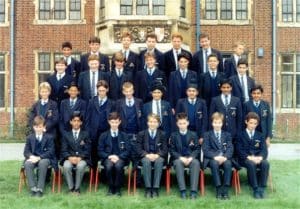 Had was in the cast for the drama production, The Hitchhiker’s Guide To The Galaxy, along with several of the classmates pictured in his class photo. A member of Pearce House, he recalls spending a great deal of time enjoying Drama and Music, as well as in the computer lab and in the library. “I attempted Latin. I received detention a few times in my day and was called into our Headmaster’s [Eamonn Harris] office once, but generally was a well-behaved pupil.”
Had was in the cast for the drama production, The Hitchhiker’s Guide To The Galaxy, along with several of the classmates pictured in his class photo. A member of Pearce House, he recalls spending a great deal of time enjoying Drama and Music, as well as in the computer lab and in the library. “I attempted Latin. I received detention a few times in my day and was called into our Headmaster’s [Eamonn Harris] office once, but generally was a well-behaved pupil.”
On leaving, he studied at the University of Hertfordshire. After that, he embarked on his first career, working for a Watford-based charity with a mission to raise £1m, and then £1m every year, to turn a derelict hospital built in 1925 into what is now the Peace Hospice.
“I spent about six years working for the Hospice, managing a group of about 40 awesome volunteers who never seemed to tire as we raised money through charity shops and holding, or helping to organise, hundreds of public fundraising events. The hospice opened a temporary day care centre in mobile offices, until HRH Princess Michael of Kent opened the main facility in 1996.
“I also was an active member of the Radlett Round Table. During this period, I made so many friendships and relationships with volunteers, local mayors, doctors, celebrities, press, MPs, members of the clergy, JPs and an OBE, some of whom I still communicate with today.
“In 1999, I found myself uprooting my small village way of life and moving to the dry heat of the Sonoran Desert in Arizona.” Unable at the time to afford the cost of transferring his UK qualifications to the US, he went to college there, while also starting a job as a critical accounts specialist for a small, family-run credit counseling agency.”
“This agency grew ten times larger by 2002. Within a year, I found myself passing five IT industry certifications and being hired in the IT department. The following year, I took an active role in designing the IT infrastructure in their new 40,000sq ft state-of-the-art call centre here in North Phoenix. This was my first exposure to some newfangled technology called ‘virtualisation’. I was hooked on VMware.”
[In computing, virtualisation refers to the creation of a virtual (rather than actual) version of something, including virtual computer hardware platforms, storage devices, and computer network resources. VMware is a global company providing cloud computing and virtualisation software and services.]
“After spending ten years at this agency and working my way up the IT ladder, I had completed another degree and a series of updated IT certifications specialising in virtualisation and security.”
Although he had no thought of leaving the company, since he enjoyed the friendly work atmosphere, he applied to, and was interviewed for, all kinds of jobs in order to gain experience in application-writing and interviewing tactics (“Something I recommend if you have the time.”)
“I was contacted by an HR firm in New York who were looking for a Support person for a Phoenix-based company. On the phone, I found out the company, 10ZiG Technology, was across the street from the agency I was working at, so I took the interview with the CEO. The interview lasted an hour: we talked little about the company or position; we talked about life, England and moving to America. The owner of the company was originally from Leicester; the company had offices in the UK, Israel, Sydney and Italy, and was now headquartered in Phoenix. That evening the CEO sent me a rather nice job offer through email. I took two days to think about the offer and graciously wrote back and declined. The next day I received a substantially increased offer to take on the role of Support & Technical Manager of 10ZiG Technology – which I jumped at.
“I spent five years with this company, continuing my passion for virtualisation. I had the pleasure of travelling the US – and a few times back to England – for meetings, dealer presentations/conferences. During this time, I specialised in many different virtualisation solutions, but mainly focused my talents on those from VMware.
He had no intention of leaving “the 10ZiG family”, where the perks included paid visits back home to the UK, until he was contacted by a recruitment officer for the one company that he had dreamed of working for, VMware itself. “The gruelling interview process lasted four months of phone and of one-to-one and panel interviews, which included on-the-spot whiteboarding demonstrations.”
In December 2015, he was offered a position with VMware within its prestigious Technical Account Organization. Today he is a Senior VMware Technical Account Manager, engaged with a small set of VMware US’s large Enterprise customers. “I am my customers’ single point of contact for all their VMware-related questions, and I provide them with enablement, recommendations, coordinate projects, issue-management and problem-solving resolutions from my experience and skill sets. I am constantly building my knowledge and expertise on the latest and future technological solutions that transform traditional IT shops to the next generation of hybrid of on-premises and cloud-based datacentres.”
Three-and-a-half years ago, Had married Christa. They recently moved to an area outside the Phoenix metropolitan area “nestled in the mountains, away from the city life”. Had relishes this environment: “There is a beauty to the Arizona landscape, with the natural hardscaped desert, rock and abundant plant life and animals that survive here. We both enjoy hiking around the mountains in our area, but also enjoy taking a break from the heat by going just 100 miles up the road to the forests.”
That heat can be considerable: on the day he wrote to Alumni News, it hit 111F (44C). “It is something to get used to. Also something to get used to is that Arizona is still considered the wild, wild west, founded just 107 years ago. We have active cattle ranches, bull-riding, gold and silver mines, real cowboys and [the historic town of] Tombstone; gold-panning is still a thing here.
“In my spare time here in Arizona, my wife and I continue our shared passion for giving back and serving. We have spent 10 years volunteering with multiple charitable organisations, such as Canine Companions for Independence (CCI), who breed and train highly skilled service dogs, providing them free of charge. We get to spend time with our puppies in training and also to spend a day golfing with celebrity pro-golfers and even Alice Cooper (pictured with Had).
“Another big volunteering passion of ours is Make-A-Wish, founded in Arizona. My wife and I are on track to grant a total of over 70 wishes for our ‘Wish-Kids’ this year as volunteer ‘Wish-Granters’.”
There is even cross-over between his charity work and his professional career, thanks to VMware’s own ethos of service and its partnership with Make-A-Wish. “Since the beginning of 2019, I have been volunteering my VMware expertise with Make-A-Wish HQ here in Arizona under the guidance of Make-A-Wish’s CIO and Senior IT Director by providing pro bono VMware Team Account Management services. So now I get really get to combine my career and my passion for giving back.”
In addition, VMware takes an active interest in all his charity work, encouraging him to log his hours not only with Make-A-Wish, but also with CCI and church ministries with which he is involved. “Once I reach 40 hours a year (which doesn’t take me long), VMware awards me with $1000 to a send to a charity. This year I have selected The Friends of Queen Elizabeth’s to receive the grant.”
On his recent trip back to QE, he enjoyed the opportunity to spend time with the Headmaster, Neil Enright, and to take a tour. “I thoroughly recommend to any OE to reach out and book time for a visit if you have not been back in the last 10-plus years. I think you will be amazed at the recent history and achievements of Neil, his team and the pupils.”
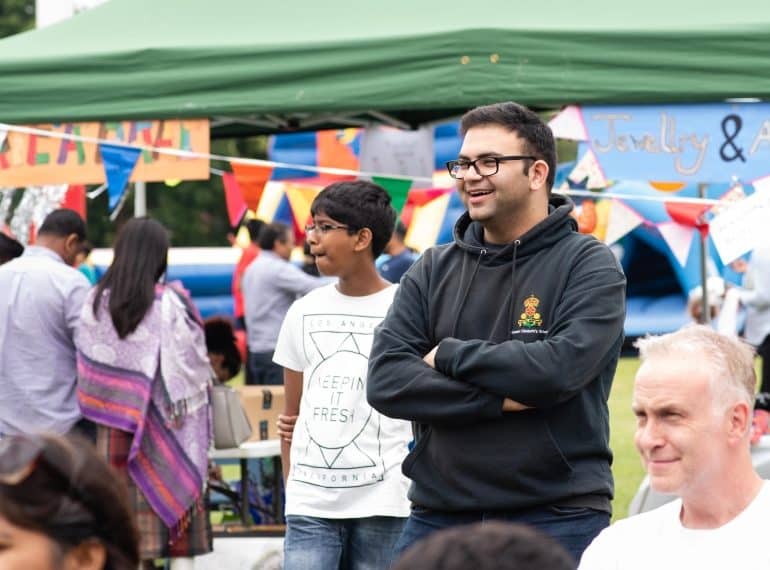
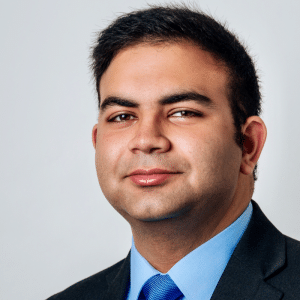 Karan (OE 2006–2013) first began working in the rail industry on internships while taking a Civil and Structural Engineering Master’s degree at Sheffield, which he completed in 2017. He works for the American civil engineering giant, Jacobs.
Karan (OE 2006–2013) first began working in the rail industry on internships while taking a Civil and Structural Engineering Master’s degree at Sheffield, which he completed in 2017. He works for the American civil engineering giant, Jacobs.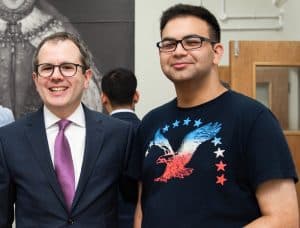 Karan tries to stay in touch both with the School and with fellow alumni. Last year, he gave a talk to current pupils; he recently attended Founder’s Day and the QE Careers Convention, and he is looking forward to the new University Mock Interview Evening later in the year. “Such events provide a great opportunity to meet old friends and network.”
Karan tries to stay in touch both with the School and with fellow alumni. Last year, he gave a talk to current pupils; he recently attended Founder’s Day and the QE Careers Convention, and he is looking forward to the new University Mock Interview Evening later in the year. “Such events provide a great opportunity to meet old friends and network.”
 Had was in the cast for the drama production, The Hitchhiker’s Guide To The Galaxy, along with several of the classmates pictured in his class photo. A member of Pearce House, he recalls spending a great deal of time enjoying Drama and Music, as well as in the computer lab and in the library. “I attempted Latin. I received detention a few times in my day and was called into our Headmaster’s [Eamonn Harris] office once, but generally was a well-behaved pupil.”
Had was in the cast for the drama production, The Hitchhiker’s Guide To The Galaxy, along with several of the classmates pictured in his class photo. A member of Pearce House, he recalls spending a great deal of time enjoying Drama and Music, as well as in the computer lab and in the library. “I attempted Latin. I received detention a few times in my day and was called into our Headmaster’s [Eamonn Harris] office once, but generally was a well-behaved pupil.”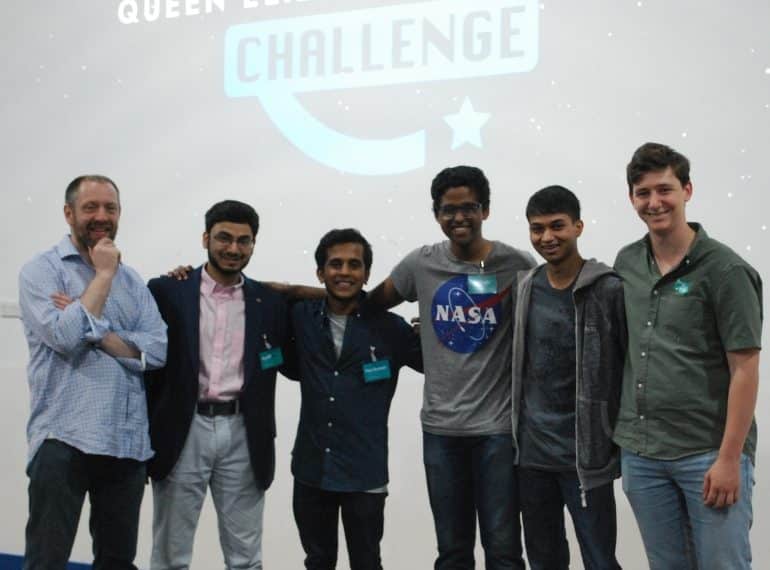
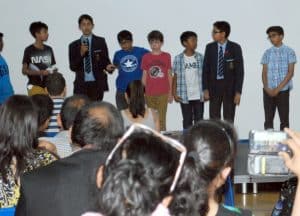 Aadil Kara (OE 2010–2017), who has just completed the second year of a Physics degree at Imperial College, is currently Chair of the Galactic Challenge (GC) – a regional competition for younger pupils and a sister competition to the UK Space Design Competition (UKSDC). In his final year at QE, Aadil progressed from the UKSDC to the International Space Settlement Design Competition, hosted by NASA’s Kennedy Space Center.
Aadil Kara (OE 2010–2017), who has just completed the second year of a Physics degree at Imperial College, is currently Chair of the Galactic Challenge (GC) – a regional competition for younger pupils and a sister competition to the UK Space Design Competition (UKSDC). In his final year at QE, Aadil progressed from the UKSDC to the International Space Settlement Design Competition, hosted by NASA’s Kennedy Space Center.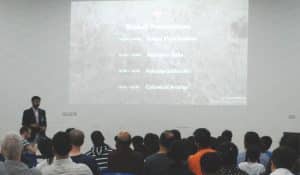 Helping Aadil and Mr Brooke were Aadil’s QE contemporaries and former UKSDC co-competitors, Neelesh Ravichandran, Harikesan Baskaran and Sam Bayney, as well as David Dubinksy, who attended QE from 2012–2016. Neelesh, Harikesan and Sam all served as Coordinators on the day, while David, who, like Aadil, reached the international stages of UKSDC in his year, was the volunteer CEO for one of the competing teams, or ‘companies’.
Helping Aadil and Mr Brooke were Aadil’s QE contemporaries and former UKSDC co-competitors, Neelesh Ravichandran, Harikesan Baskaran and Sam Bayney, as well as David Dubinksy, who attended QE from 2012–2016. Neelesh, Harikesan and Sam all served as Coordinators on the day, while David, who, like Aadil, reached the international stages of UKSDC in his year, was the volunteer CEO for one of the competing teams, or ‘companies’.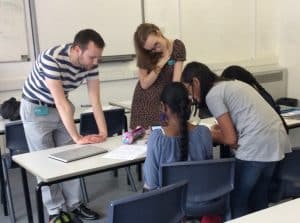 Aadil said: “We run GC competitions throughout the country firstly to stimulate students’ interests in STEM from the early ages of secondary education, and secondly to help them develop ‘soft skills’, including team-working and interpersonal skills. Having first participated in the process in the Sixth Form, it was a pleasure to be able to bring the competition back to the School.”
Aadil said: “We run GC competitions throughout the country firstly to stimulate students’ interests in STEM from the early ages of secondary education, and secondly to help them develop ‘soft skills’, including team-working and interpersonal skills. Having first participated in the process in the Sixth Form, it was a pleasure to be able to bring the competition back to the School.”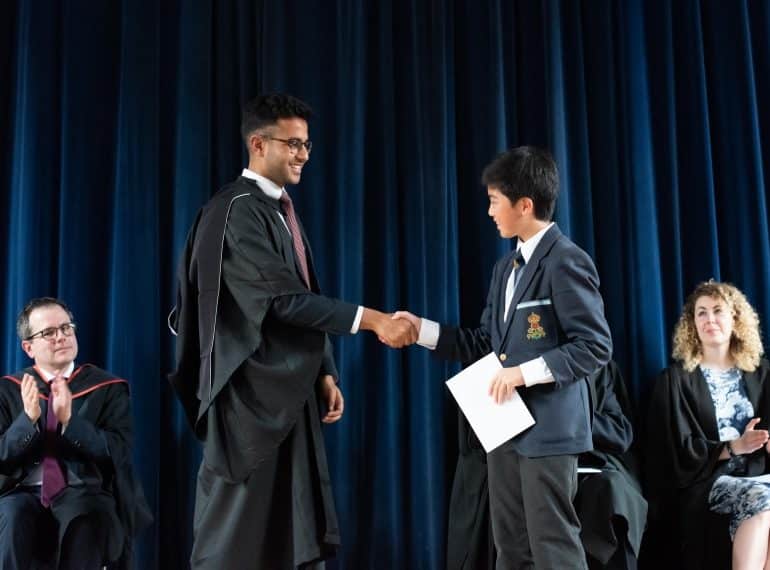
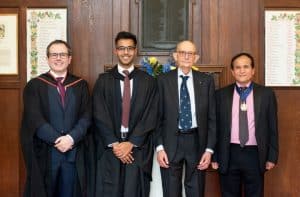 The formal ceremony in the School Hall took its traditional form, with the audience of prize-winners, their parents, VIP guests and staff treated to classical music interludes during the prize-giving.
The formal ceremony in the School Hall took its traditional form, with the audience of prize-winners, their parents, VIP guests and staff treated to classical music interludes during the prize-giving. “Try new things and broaden your base of skills and knowledge, as your generation will need to adapt in an economy and a society disrupted by technology and associated structural change.”
“Try new things and broaden your base of skills and knowledge, as your generation will need to adapt in an economy and a society disrupted by technology and associated structural change.”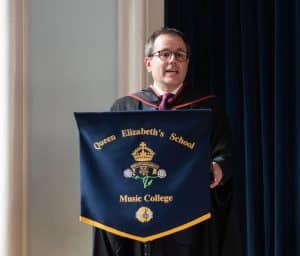 The implications of this for QE’s pupils were clear: “It is through a rounded combination of academic, technical, creative and social skills that progress on the biggest issues facing us in the future will rely. This is a roundedness we try to prepare you for…You are in a privileged position to be well set to face that future with confidence and optimism, building on your prior success to progress further and further, to thrive in a changing world, and to change it.”
The implications of this for QE’s pupils were clear: “It is through a rounded combination of academic, technical, creative and social skills that progress on the biggest issues facing us in the future will rely. This is a roundedness we try to prepare you for…You are in a privileged position to be well set to face that future with confidence and optimism, building on your prior success to progress further and further, to thrive in a changing world, and to change it.”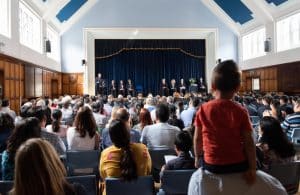 The Headmaster also welcomed the Guest of Honour, Old Elizabethan Akash Gandhi (2005–2012), who, he told the audience, had himself picked up no fewer than five Junior Awards when he was in Year 7, for Geography, Mathematics, Science, Stapylton House and the overall Charles Fitch Memorial Award for Outstanding Commitment.
The Headmaster also welcomed the Guest of Honour, Old Elizabethan Akash Gandhi (2005–2012), who, he told the audience, had himself picked up no fewer than five Junior Awards when he was in Year 7, for Geography, Mathematics, Science, Stapylton House and the overall Charles Fitch Memorial Award for Outstanding Commitment.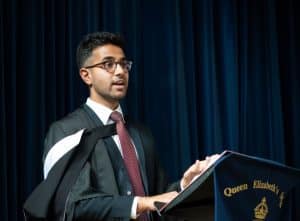 On leaving, he went up to Queens’ College, Cambridge, to read Medicine, taking a first-class degree with prize & honours. From there, he went to University College London, for his clinical training, again excelling in his studies. Akash is now a Junior Doctor in Northwick Park Hospital, Harrow, but carves out time every year to support QE’s aspiring Sixth Form medics with their UCAT (University Clinical Aptitude Test) preparations.
On leaving, he went up to Queens’ College, Cambridge, to read Medicine, taking a first-class degree with prize & honours. From there, he went to University College London, for his clinical training, again excelling in his studies. Akash is now a Junior Doctor in Northwick Park Hospital, Harrow, but carves out time every year to support QE’s aspiring Sixth Form medics with their UCAT (University Clinical Aptitude Test) preparations.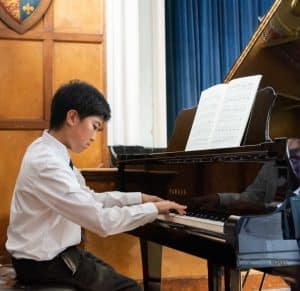 And Akash had three specific areas of advice. The first was to find and follow your passions. “During my time at QE, my passions were my culture, cricket, charity work and football. And so, at university I found myself as the Vice-President of Cambridge University’s India Society. I also captained my college’s cricket team all the way to the final of the cup tournament – despite only ever representing QE’s C team.”
And Akash had three specific areas of advice. The first was to find and follow your passions. “During my time at QE, my passions were my culture, cricket, charity work and football. And so, at university I found myself as the Vice-President of Cambridge University’s India Society. I also captained my college’s cricket team all the way to the final of the cup tournament – despite only ever representing QE’s C team.”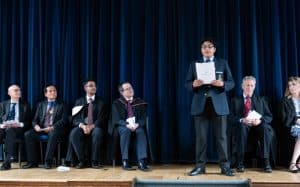 “I can safely say that I am still surrounded by the values, ethos and ethic that I felt whilst studying at QE. I suppose that’s easy to say when I got to work last Friday to find that four out of the five doctors on my team were also QE boys. And as for the fifth? She’s a proud mother of a son who currently goes to QE!
“I can safely say that I am still surrounded by the values, ethos and ethic that I felt whilst studying at QE. I suppose that’s easy to say when I got to work last Friday to find that four out of the five doctors on my team were also QE boys. And as for the fifth? She’s a proud mother of a son who currently goes to QE!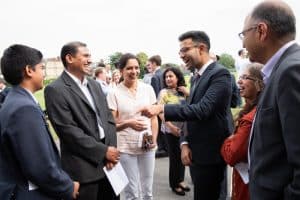 and the Bohemia-born Josef Fiala, who died in 1816. A Recessional piece was composed by Year 12’s Ifeatu Obiora and Federico Rocco.
and the Bohemia-born Josef Fiala, who died in 1816. A Recessional piece was composed by Year 12’s Ifeatu Obiora and Federico Rocco.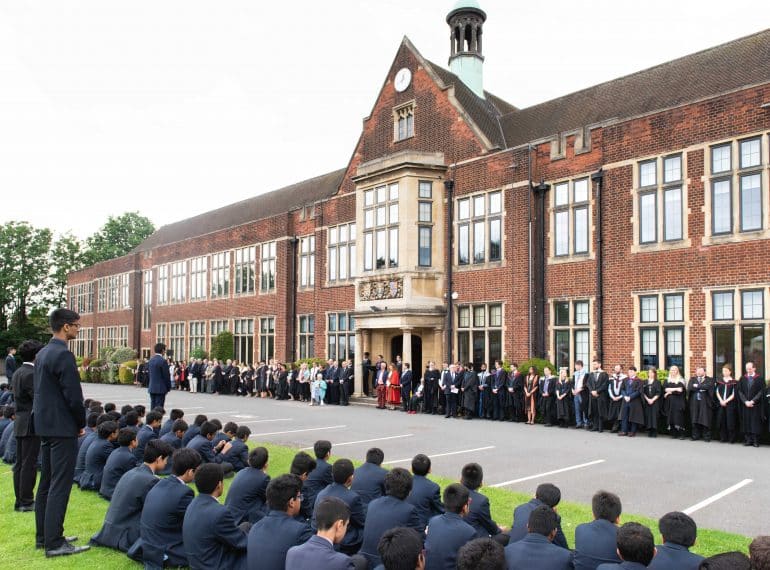
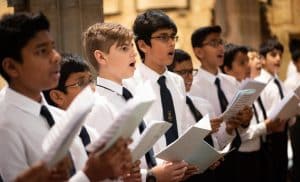 Pupils, old boys, parents, staff and many other supporters of the School turned out in force for the afternoon fete, which followed the traditional church service and the reading of the School roll and of the School Chronicle earlier in the day.
Pupils, old boys, parents, staff and many other supporters of the School turned out in force for the afternoon fete, which followed the traditional church service and the reading of the School roll and of the School Chronicle earlier in the day.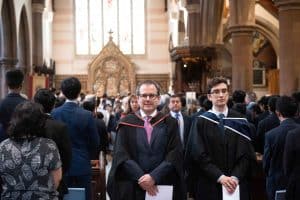 the Chamber Choir’s contributions to the service.
the Chamber Choir’s contributions to the service. as a career. “Your friends might all want to become lawyers, perhaps your parents want you to become a doctor. These are good professions, interesting, challenging and worthwhile. But you shouldn’t live someone else’s dream. If you do, neither you nor they will be fulfilled…There’s an old adage here: choose a job you love, and you’ll never work another day in your life.
as a career. “Your friends might all want to become lawyers, perhaps your parents want you to become a doctor. These are good professions, interesting, challenging and worthwhile. But you shouldn’t live someone else’s dream. If you do, neither you nor they will be fulfilled…There’s an old adage here: choose a job you love, and you’ll never work another day in your life.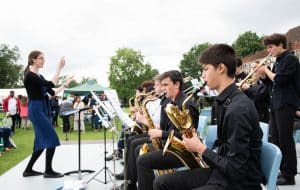 tive about how to do what you enjoy, and do it. Because you can do it. You’re bright. You’re at a top school, and you’re in one of the world’s most dynamic cities. You can do it. But it’s up to you to decide what ‘it’ is. Now go do it,” he concluded.
tive about how to do what you enjoy, and do it. Because you can do it. You’re bright. You’re at a top school, and you’re in one of the world’s most dynamic cities. You can do it. But it’s up to you to decide what ‘it’ is. Now go do it,” he concluded.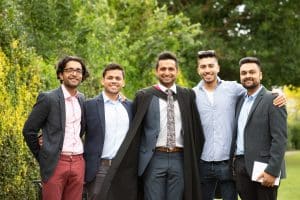 the Main Building for the reading of the roll and of the School Chronicle. This tradition, established by Headmaster Ernest Jenkins in 1930, involves the Headmaster reading aloud a formal history of the School, which is updated annually.
the Main Building for the reading of the roll and of the School Chronicle. This tradition, established by Headmaster Ernest Jenkins in 1930, involves the Headmaster reading aloud a formal history of the School, which is updated annually.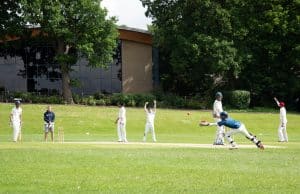 alumni participated in the afternoon’s cricket match, which pits the School against an OE XI. Changeable conditions made for a tricky wicket for the batsmen on both sides.
alumni participated in the afternoon’s cricket match, which pits the School against an OE XI. Changeable conditions made for a tricky wicket for the batsmen on both sides.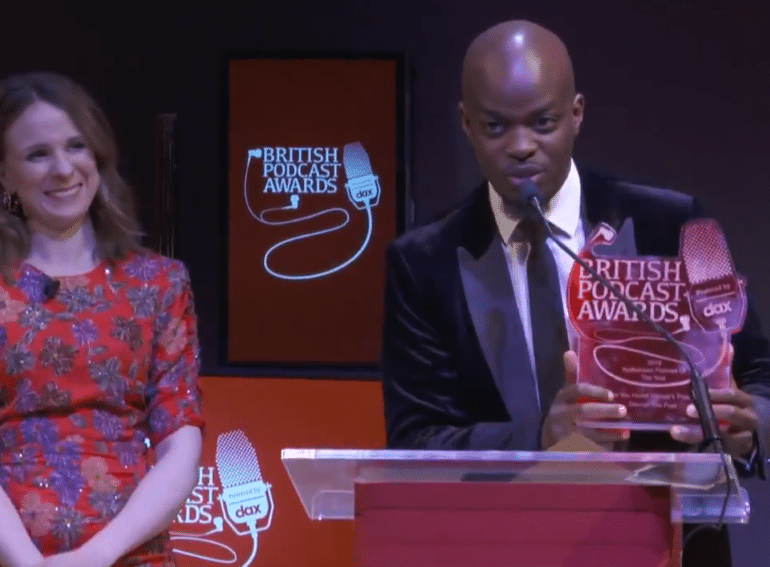
 There was reward, too, for another QE alumnus, Bilal Harry Khan (OE 2003–2010). Over the Bridge, a podcast Bilal makes with three black and mixed-race friends he met while studying at Cambridge, won bronze in the Acast Moment of the Year category. Bilal took the time to congratulate his fellow Elizabethan, George, on his success via Twitter.
There was reward, too, for another QE alumnus, Bilal Harry Khan (OE 2003–2010). Over the Bridge, a podcast Bilal makes with three black and mixed-race friends he met while studying at Cambridge, won bronze in the Acast Moment of the Year category. Bilal took the time to congratulate his fellow Elizabethan, George, on his success via Twitter. rds, George told the BBC that he first established the podcast because he “wanted to give young people a way to rethink their situation, especially if they’re in the inner city like I was”.
rds, George told the BBC that he first established the podcast because he “wanted to give young people a way to rethink their situation, especially if they’re in the inner city like I was”.